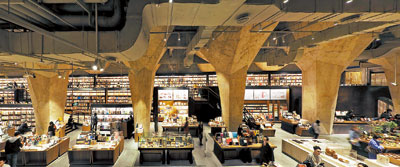 JUST when people have gotten used to hearing about bookstores closing down because of slack business, more and more brand bookstores are entering our lives. In November, well-known Taiwan-based Eslite Bookstore opened in Suzhou, Jiangsu Province, and very soon the well-known Japanese retailer MUJI will open its flagship bookstore in Shanghai. Eslite’s Shenzhen store is expected to open in 2017. Also in November, Amazon, the world’s largest online bookstore, opened its first brick-and-mortar bookstore in the United States, and Dangdang.com, one of the largest Chinese online bookstores, announced its plans to open 1,000 brick-and-mortar bookstores across the country within three years. Not only are bookstores embracing a new era, book sales are seeing a new wave of growth. According to the 2015 Book Retail Market Report released by a national book industry data organization earlier this month, compared to 2014, book sales increased by 12.8 percent in 2015 while sales at brick-and-mortar bookstores have increased by 3.26 percent. Book sales through online stores saw an increase of 33.21 percent in 2015. The statistics also show that the total fixed price (the price printed on the book multiplied by copies of books printed) for China’s book retail industry in 2014 reached more than 50 billion yuan (US$7.61 billion). Of that, the total fixed price for brick-and-mortar stores reached about 34 billion yuan, 14 billion yuan more than online stores, an increase of 3.26 percent compared to 2013. This was the first growth brick-and-mortar stores have seen in three years. The increase in sales in 2015 was also seen in many other areas around the world, such as the United States. However, it may still be a little early to predict a new and positive era for the industry. Even though total fixed prices are increasing, there has not necessarily been a growth in profit. “At present, only about 30 percent of brick-and-mortar bookstores are actually making money,” said Sanshi, well-known Chinese publisher. “More than 25 percent of the books that have been sold are support materials for educational purposes. The other three main categories are social science, children’s books and literature while most books sold through online stores are social science books. “If not for educational books, brick-and-mortar bookstores would not be as profitable as online stores,” he said. Regardless of what the data shows, many bookstore owners and companies are still working hard on exploring a new way of doing business. And for them, the answer is multiple economies. Sisyphe Bookstore is one of the pioneers. The store started its expansion in 2013 and currently has four branches in Shenzhen. Compared to traditional bookstores, it has two unique items — Up Coffee and Bookart Life Store. “Although only 20 percent of our business comes from the coffee shop and cultural products, the unique experience they offer has significantly helped us attract more loyal customers,” said Jin Weizhu, president of the bookstore. “Bookstores nowadays are no longer just for people seeking for knowledge. It serves people who have buying power and seek spiritual pursuits.” “Any city with a population of more than 300,000 needs bookstores, which has raised the requirements for operators. We cannot only put books on shelves and sell them. We need to figure out how to incorporate them into other factors before selling them,” said Liu Suli, founder of Wansheng Bookstore. Many estate developers have also set their eyes on bookstores with multiple economies, offering discounts and preferential policies for bookstores that offer special experiences to visitors. The new multiple-economy business has also attracted online bookstores. “Dangdang.com is now planning bookstores of different kinds. We plan to have stores at places such as city landmarks, airports and in residential communities, and we also plan to have stores in different styles such as family stores, cultural stores and library-style stores. They can be independent stores and can also be in shopping centers,” said Mo Jun, an official from Dangdang.com. According to Dangdang’s plan, books sold at the brick-and-mortar stores will be the same prices as those sold at their online stores, and the company will choose specific books using big data analysis. “Our goal is to create a multiple cultural retailer using the book and culture resources we have obtained over the years,” said Mo. (Wang Yuanyuan) | 
